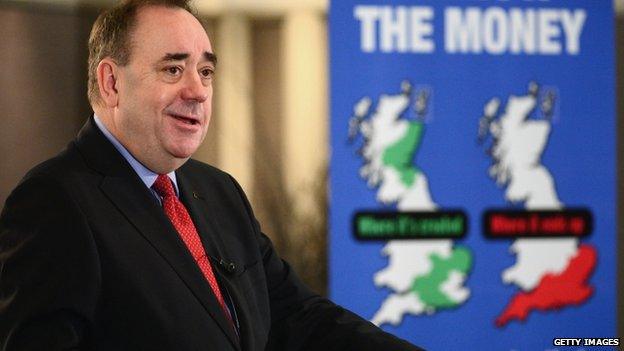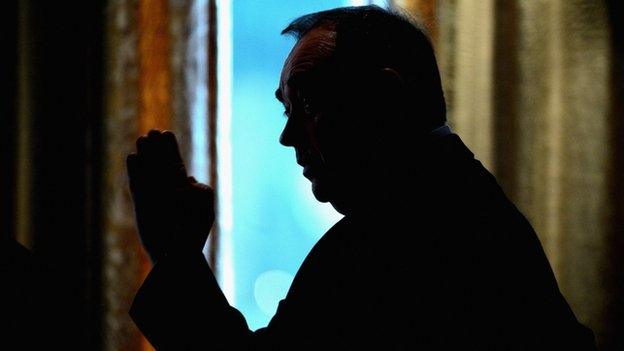Scottish independence: Salmond 'wedded to currency union'
- Published

Alex Salmond's demeanour in his Aberdeen speech was intriguing.
He was addressing business supporters. His audience like independence. Yet, from the first minister, zero in the zone of rhetoric, no Nationalist bombast whatsoever.
Why? Because, of course, his true audience lay well beyond the Aberdeen hotel - where, incidentally, Mr Salmond launched his campaign for re-election as party leader; an initiative that led us, albeit circuitously, to today's referendum.
Mr Salmond knows well that the faithful will vote 'Yes' in the referendum, regardless of George Osborne's comments upon the currency.
They yearn for independence, they cleave to it. Indeed, if anything, their zeal may be reinforced by the latest controversy.
However, to win this referendum, the first minister knows he has to convince the sceptical, the fretful, the anxious, the uncertain, the disquieted.
Alex Salmond outlines four "points of real importance" in the independence debate
Those who gaze upon the independence project and mutter: "Aye, but . . ."
Consider the section of the speech in which he said that Scotland, post independence, would not regard the remainder of the UK as foreign territory.
He called in evidence the relationship between Ireland and the UK.
On the face of it, this is appealing to the remainder of the UK, rUK.
However, it was also plainly pitched at doubters in Scotland. Those, in short, who have votes in this referendum rather than simply a role as intrigued and interested observers.
Similarly, his complaint about "bullying" by the Downing Street posse is not seriously intended to obtain an apology or anything like it.
Rather it is intended to characterise or caricature his rivals, to evoke sympathy - and thus votes - from people in Scotland, coached from an early age to beware of "bullies."
There was statistical substance in Mr Salmond's speech.
For example, he argued that the Chancellor had over-egged the potential impact of oil price shocks in his speech last week resisting any prospect of monetary union between rUK and an independent Scotland.
This matter, according to Mr Salmond, was dealt with via the plan for a fund to iron out variations.
Critics say such a fund would require spending constraint elsewhere. Workable, say Nationalists, doable.
Then he contested the Chancellor's point re the potential vulnerability of Scotland's finance sector.
It was over-estimated, Mr Salmond said, including financial operators which, in practice, were based in the City of London rather than Scotland - meaning they would fall under the ambit of rUK monitoring and, if needed, rescue.
This point is re-contested in return.
But Mr Salmond's wider point rests upon the classic question "cui bono". Whose interests are served?
For, once again, the independence offer is facing its toughest challenge where it interfaces with other power bases, where it rubs up against other decision makers.
It is not, solely, in Scotland's hands to create a sterling currency zone in these islands, in the event of Scottish independence.
It is not, solely or even largely, in Scotland's hands to determine EU membership.
Which would not matter all that much if these were peripheral issues.

However, they are very far from that. They are central. Particularly the currency.
Folk, it would appear, want to keep the pound. Electorally, the Euro is a no go. A new Scottish currency? Too scary at the moment: this is about reassurance.
Hence the sterling zone.
Mr Salmond argues that, in both cases, problems which appear extant at the moment would dissipate in the event of a 'Yes' vote.
He argues that it would be in the interests of the remainder of the EU to facilitate Scottish membership.
Similarly, he says, it would be in the interests of rUK to endorse a currency zone, not least because it would forestall trading costs which would hit rUK firms doing business north of the border.
No, say critics. This is a serious statement from all three main UK political parties, founded upon a hard-headed assessment of the costs which could arise - for example in providing a continuing guarantee to Scottish banks.
Plus, say those critics privately, it would be a decidedly hard sell, politically, to persuade the people of England to maintain a financial arrangement with folk who had just voted to end the Union.
Independence 'calculation'
So is there available the much-vaunted Plan B. (Vaunted, that is, by the opponents of independence.) Not in those terms.
Mr Salmond is scarcely going to advance a sterling zone only to talk up a substitute.
That would simply prompt complaints from critics that he is unsure and unstable about a key aspect of the independence offer.
However, the de facto Plan B is for Scotland to use the pound unilaterally, without agreement.
Mr Salmond has mentioned such a prospect in previous speeches.
Is it his favoured option? Very far from it. Mr Salmond remains wedded to union - currency union, that is.
Which leaves us where?
Chief Treasury Secretary Danny Alexander: "Currency union just isn't going to happen"
It leaves Alex Salmond, the SNP and the Scottish government promoting a message on the currency which is somewhat more complex than they would desire.
Back independence on the calculation that the present objections to a shared currency would vanish in the event of a 'Yes' vote.
Back independence on the calculation that it delivers other key gains in fiscal, competition and economic policy.
It leaves the advocates of Union with a rather simpler pitch. You want the pound? Keep the union.
I suspect the simplification of that message lies in an amalgam of sundry contributions. The Treasury, the Chancellor, Labour, the Lib Dems.
However, I believe that Alistair Darling of Better Together played a significant role.
Previously, Treasury ministers and others were talking of a currency union as highly unlikely or improbable.
He argued: if you aren't going to sign up to a deal, then say so, without equivocation. Keeping it simple.